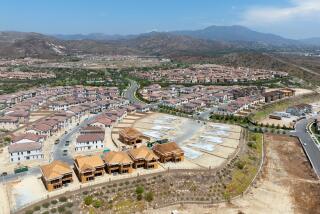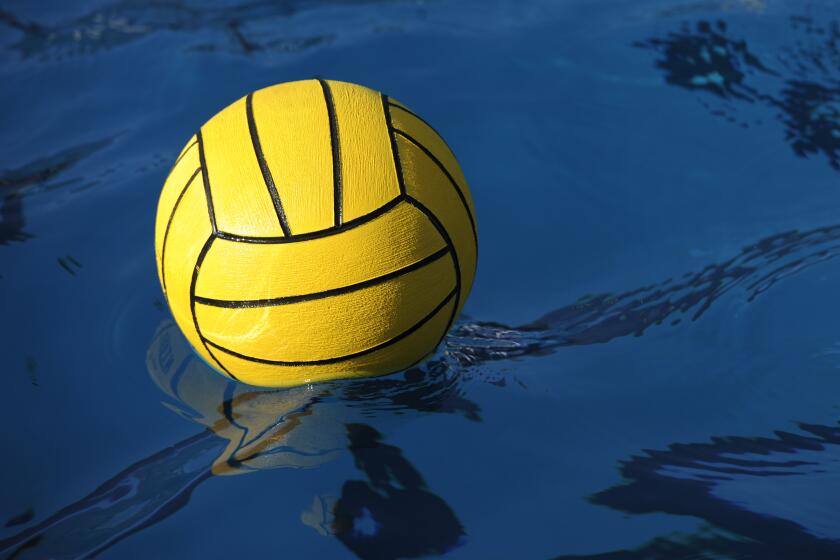Two Views of Sport
IRVINE — Mandatory sports in high school? Not bloomin’ likely.
That may be the common opinion in Britain, where few students get more than two hours a week of physical education. But for Irvine High School freshman Chris Sinner, who spends up to five hours a day exercising, sports is life.
“I really love sports,” said Sinner, 15, who plays for the school’s freshman football and junior varsity baseball teams. “I couldn’t imagine what I’d do without it.”
A star athlete at his hometown school, Sinner soon will be broadcast on international television. The British Broadcasting Corp. followed Sinner on campus all Monday for a news show comparing the differences in sports activities between American and British students. The segment will air in Britain on a weekly program called “Health Check” in coming weeks.
Unlike the United States, the British government does not require school children to take physical education classes to graduate. Irvine High students, however, must pass two years of daily physical education classes.
“You would have 80-year-olds in Britain who would never pass under such a system,” quipped Alice Beer, a BBC correspondent. “It’s not that they are lazy, it’s just significant differences in the lifestyles.”
The California sunshine and more open space for recreational facilities play to this area’s advantage, BBC staff said.
“In Britain, you can never guarantee a warm or dry day in mid-August,” said Owen Gay, BBC producer. “It could rain or be cold and miserable.”
Athletic facilities are also sparser.
“There’s usually one local swimming pool for the schools in each town,” Beer said, in awe of the Olympic-size outdoor swimming pool to which Irvine High students have access.
Through an agreement with the city, Irvine High uses Heritage Park facilities, which include three swimming pools, 20 tennis courts and a softball field. The school site also has its own baseball and football fields and a stadium that holds up to 3,500 people.
The BBC chose to profile an Irvine student because their own Olympic champion runner Roger Black trains at the U.C. Irvine.
“Sports here is really impressive,” she said. “It’s fantastic.”
At the high school’s 2,500-student campus, about 1,000 students join a sport, a choice that can fulfill physical education requirements. There are also 21 sports year-round for boys and girls, Principal Gail Richards said. Those who do not take a sport can fulfill the requirement through regular P.E. classes.
“Sports are so much a part of our educational system,” Richards said.
Virtually every sport has both a boys and girls team at Irvine High. The girl’s water polo team was created this year, and girl’s golf is expected to begin in two years.
Throughout Monday, the four-person BBC crew zigzagged through the campus capturing students’ comments about sports.
Midmorning, the crew dropped by the gymnasium, where students were jamming to aerobics classes or lifting weights. They planned to interview Olympic gold medalist Amanda Beard at poolside, but she unexpectedly had to visit the doctor.
As they lifted and jumped, the students also were very aware of the cameras panning their activities, giggling and looking over their shoulders.
“You are very lucky you have all this space,” said BBC soundman Pasfield. “It’s so nice to drive by a neighborhood and see there’s a recreational center for the youth.”
Gay added, “We wanted to do this segment because children in Britain don’t get enough physical activity. We fear that their health will decline with age.”
Last year, the British Medical Journal cited a survey of 4,400 children age 6 to 16 that revealed less than half “spent two or more hours per week in physical education and . . . few experience regular levels of activity at school or at home sufficiently energetic to stress their heart and lungs appropriately.”
Such apparently is not a concern at Irvine High.
Cheering for their Vaqueros mascot and building strong school spirit is a priority here, parents and students said.
“Without school sports a child becomes too sedentary,” said Shirley Whitted, Irvine High’s assistant coach for the girl’s swim team and a mother of four children. “Sports help kids build strong work ethics. Student athletes have to learn how to manage their time between their studies, social life, and sports.”
Dressed in his tattered baseball shoes and dirt-stained uniform for a light day of practice, Sinner told the BBC during an interview about his passion for sports as the camera zoomed in on him.
“It’s about discipline, good health and staying fit,” Sinner said.
More to Read
Get our high school sports newsletter
Prep Rally is devoted to the SoCal high school sports experience, bringing you scores, stories and a behind-the-scenes look at what makes prep sports so popular.
You may occasionally receive promotional content from the Los Angeles Times.






